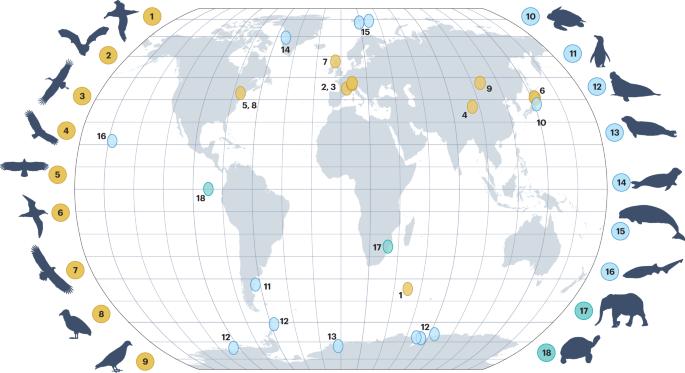以动物为载体的传感器从生物学角度透视不断变化的气候
IF 29.6
1区 地球科学
Q1 ENVIRONMENTAL SCIENCES
引用次数: 0
摘要
随着气候变化改变生物圈,需要对不断变化的条件进行更全面、更符合生物学规律的测量。传统的气候测量通常受制于静态地理、粗放、稀疏和偏差采样,而且只能间接联系到生态反应。在此,我们将讨论动物携带的传感器如何提供空间细粒度、生物微调、相关的气候条件采样,以支持生态和气候预测。动物携带的传感器已经从一千多个物种中收集了数百万个精细尺度的气象观测数据。我们强调这些不断增长的数据为生物多样性与气候科学的交叉提供了机遇,尤其是在陆地环境中。全球被标记的动物可以填补关键数据缺口,提供有关生态系统变化的见解,并广泛发挥环境哨兵的作用。在本《视角》中,作者强调了动物载传感器克服传统气候测量常见局限性的潜力。动物载传感器可以提供精细的、与生态相关的采样,被标记的动物可以在全球范围内发挥环境哨兵的作用。本文章由计算机程序翻译,如有差异,请以英文原文为准。

Animal-borne sensors as a biologically informed lens on a changing climate
As climate change transforms the biosphere, more comprehensive and biologically relevant measurements of changing conditions are needed. Traditional climate measurements are often constrained by geographically static, coarse, sparse and biased sampling, and only indirect links to ecological responses. Here we discuss how animal-borne sensors can deliver spatially fine-grain, biologically fine-tuned, relevant sampling of climatic conditions in support of ecological and climatic forecasting. Millions of fine-scale meteorological observations from over a thousand species have already been collected by animal-borne sensors. We highlight the opportunities that these growing data have for the intersection of biodiversity and climate science, particularly in terrestrial environments. Tagged animals worldwide could close critical data gaps, provide insights about changing ecosystems and broadly function as active environmental sentinels. In this Perspective, the authors highlight the potential of animal-borne sensors to overcome common limitations of traditional climate measurements. Animal-borne sensors can provide fine-grained and ecologically relevant sampling, and tagged animals could function as environmental sentinels worldwide.
求助全文
通过发布文献求助,成功后即可免费获取论文全文。
去求助
来源期刊

Nature Climate Change
ENVIRONMENTAL SCIENCES-METEOROLOGY & ATMOSPHERIC SCIENCES
CiteScore
40.30
自引率
1.60%
发文量
267
审稿时长
4-8 weeks
期刊介绍:
Nature Climate Change is dedicated to addressing the scientific challenge of understanding Earth's changing climate and its societal implications. As a monthly journal, it publishes significant and cutting-edge research on the nature, causes, and impacts of global climate change, as well as its implications for the economy, policy, and the world at large.
The journal publishes original research spanning the natural and social sciences, synthesizing interdisciplinary research to provide a comprehensive understanding of climate change. It upholds the high standards set by all Nature-branded journals, ensuring top-tier original research through a fair and rigorous review process, broad readership access, high standards of copy editing and production, rapid publication, and independence from academic societies and other vested interests.
Nature Climate Change serves as a platform for discussion among experts, publishing opinion, analysis, and review articles. It also features Research Highlights to highlight important developments in the field and original reporting from renowned science journalists in the form of feature articles.
Topics covered in the journal include adaptation, atmospheric science, ecology, economics, energy, impacts and vulnerability, mitigation, oceanography, policy, sociology, and sustainability, among others.
 求助内容:
求助内容: 应助结果提醒方式:
应助结果提醒方式:


